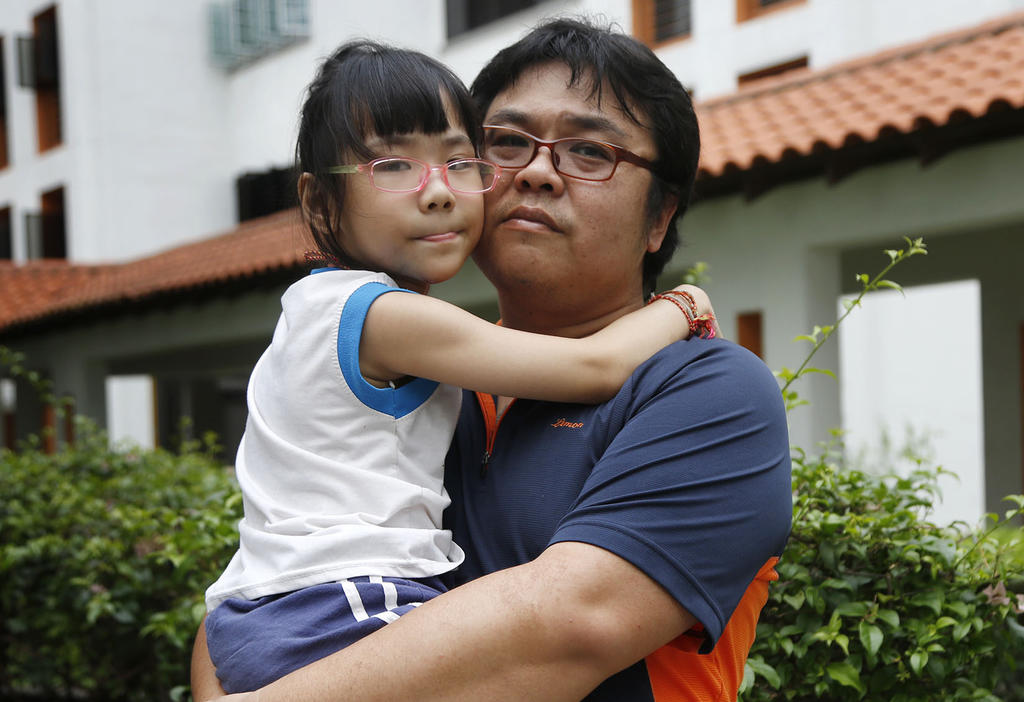
SINGAPORE — Five months ago, seven-year-old Lee Qi Zhen required her father’s help to stand.
Surgery to correct her misaligned eyes in July has changed her world: She is now able to stand and sit on her own, and has even taken her first steps.
The little girl has a convergent squint — an eye condition which causes her eyes to turn inwards — and amblyopia, also known as lazy eye, in both eyes.
She underwent surgery at KK Women’s and Children’s Hospital, and doctors told her father Lee Shang Lian it managed to correct about 85 per cent of the misalignment.
The surgery improved her three-dimensional vision which, in turn, has led her motor skills to improve by leaps.
“In the past, she needed to hold on to me to stand, sit down and walk, but now she can stand and walk on her own, and I only need to support her slightly,” said Mr Lee, a single parent whose wife died of nose cancer five years ago, two weeks shy of Qi Zhen’s second birthday.
Qi Zhen also has global development delay, a condition that affects her cognitive abilities and mobility. “Even though she is seven, her cognitive ability and motor skills are closer to that of a two-year-old,” said Mr Lee, 40, in Mandarin.
After the surgery, “she is able to hold a cup and spoon, and would try to drink and eat on her own, though she still struggles at times. She is also able to recognise and make out faces; she knows who’s who”, said Mr Lee, who used his Medisave funds to foot the hospital bill after Government subsidies.
Qi Zhen’s situational awareness has also improved and she is generally happier.
“Now, she even picks out the dresses she wants to wear,” joked her father.
Like his daughter, Mr Lee is getting back on his feet.
He had to quit his job as a store assistant and delivery driver two years ago to take care of Qi Zhen full-time. The duo lived from hand-to-mouth, surviving on S$600 to $700 in monthly assistance from various funds and welfare organisations.
About two months ago, he returned to work as a private-hire driver and now earns more than S$1,500 a month.
The ability to earn a living again will allow him to save for their future.
Mr Lee credited the S$2,000 received from the TODAY Enable Fund in May for going “a long way” to help his family.
The fund, set up a year ago and administered by SG Enable, supports efforts to enhance the education, skills and employment prospects of people with disabilities.
“I used it to pay for her follow-up visits to the hospital, her medication (eyedrops) and to buy some of her day-to-day necessities,” he said.
After reading their story, which TODAY featured in July, some good Samaritans also donated about S$3,000.
The money has been used for the education expenses of Qi Zhen, a Rainbow Centre student.
Others offered their time, visiting the family and taking Qi Zhen out.
Mr Lee works nine to 10 hours daily and tries to head home for an hour in the middle of the day to check on his daughter.
In his first month of work, he had to rely on family members to look after Qi Zhen but managed to hire a Cambodian domestic helper last month.
He has stopped taking donations, saying: “I am now working to provide for my daughter with my own two hands. It gives me a sense of satisfaction. Slowly, one step at a time, I will continue to improve both our lives.”
He still worries about the future and whether Qi Zhen will be independent when she is older.
“Even when we take her out to the playground, we can see that other children do shun her. It is difficult for her to integrate,” he said.
“I hope my savings can go some way in helping her to survive and also help her to pursue an education if she wishes.”